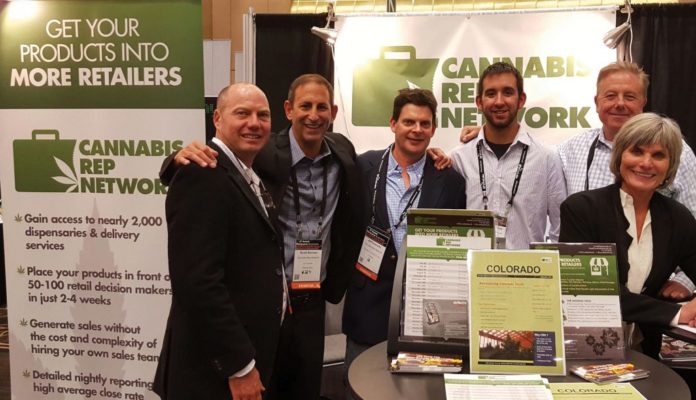Dakota Sullivan, Cannabis Rep Network’s co-founder and CEO, brings a twist to the distribution game with his “sales tour” program.
“The Cannabis Rep Network is currently the largest sales tour company in the industry,” said Dakota Sullivan, the company’s co-founder and chief executive officer. His unique “sales tour” idea works this way: CRN representatives schedule their visits with vendors in advance to meet and detail the benefits, key features, safety, formulation, and potency of medicine and other products. They’re not sales people and they don’t earn commissions. Their only job is to show you what’s new and interesting, answer questions, and handle follow-ups.
“On any visit, they’ll represent a maximum of five products or brands,” Sullivan said. “This allows them to be knowledgeable about each product and limits the time commitment from you and your staff.”
After educating their clients, CRN reps connect them directly with the appropriate supplier so they can place orders, discuss terms, and arrange for product delivery. CRN currently serves nearly 2,000 dispensaries, recreational stores, specialty stores, and delivery services.
“Since March, we’ve met with 1,000 retailers in California alone,” Sullivan said. “We’ve helped over thirty brands get products onto the shelves of over 200 dispensaries—all for a fraction of the cost of building their own sales teams.”

What was your vision when launching CRN?
First off, cannabis has been only a very casual part of my life. However, I’m a staunch believer in personal liberties and also have real issues with the way local law enforcement has used simple possession of small amounts of cannabis as a reason for selective prosecution of mostly brown and black young men. Our vision was simple: Replicate the wholesale sales and distribution model that supports most other industries into the cannabis sector. It’s clear the lack of this infrastructure is a pain point for producers and retailers alike. We saw an opportunity to fix a problem and build a healthy business.
What requests do you hear most often from dispensary owners? As part of each sales tour visit, we ask the buyer what they need, haven’t seen, or want more of. The answer varies widely by type of retailer (medical focus vs. recreational), location (Beverly Hills delivery service vs. “Cap $30” store in West Los Angeles) and season. However, everybody is always looking for quality flower, preferably exotic strains and preferably well tested. Microbial testing is a big plus. Beyond flower, most retailers are looking for whatever the currently hot extract might be—crumble, live resin, etc.
As the industry matures, do you find retailers are changing the way they buy inventory?
Depends on the size of the store. The biggest retailers now have separate buyers for flowers, concentrates, edibles, and medicals. The vast majority of dispensaries, however, still rely on a group of managers and dedicated buyers who generally need the buy-in of ownership to bring on new lines.
Do you take a commission?
In our core Sales Tour business, we do not charge commissions. We simply charge a low, flat fee per completed store visit. “Completed visit,” in our vernacular, means we do all the follow-up necessary after the initial visit to get a sales order or a definitive “no” from a buyer after their patients have tried product samples. This generally takes multiple phone calls and often repeated in-person visits.
We’ve found the data our reps gather and the nightly reporting we provide has significant value, so a model that only compensates for sales doesn’t accurately reflect the value of the service we provide.
We’re in the process of introducing a more traditional territory sales and distribution model to flank the sales tours, and that service will be commission-based.
How many sales reps do you have?
We have a core team of fewer than ten full-time sales managers and tour directors in Southern and Northern California and now Colorado. These folks manage a small army of sales contractors, generally drawn from pharmaceutical sales and detailing, who work part-time across the various sales tours.
How important is customer service to your business?
Customer service is our business. Every brand we work with is different and has unique needs. Every dispensary buyer we call on has things she or he is looking for right now, but they may need something different tomorrow. And, of course, patients’ needs change all the time. It’s our job, using data science but also human relationships, to guide our producers and manufacturers to make things patients want, and to stay on top of which retailers will be most open and receptive to which products and ideas. We do this every day across more than 1,000 dispensaries in California alone. In Colorado, we face a completely different dynamic as we engage with buyers in downtown Denver vs. remote rec stores in Vail or Eagle.
Do you work with brands and retailers on in-store marketing campaigns and product displays?
We have a marketing platform called COMP (Cannabis Online Marketing Platform) that provides extremely accurate audience-targeting across online and mobile. We leverage COMP to help drive pull-through and demand creation. For example, we can target medical marijuana patients who live or work within five miles of a certain dispensary with a promotion for a specific product or brand.
Separately, we’re starting to provide retail-merchandising services for brands. This may take the form of simply installing point-of-purchase displays or checking on how a product is displayed in dozens of dispensaries—all the way to running patient-appreciation nights or representing brands at cannabis events.
What product categories do you see having the biggest upside in 2016?
We’re going to continue to see creative new products on the rec side that combine or refine other forms of cannabis. For example, Kurupt’s Moon Rocks and Caviar Gold set off a trend of combining flowers, oil, and kief or shatter that you now see producing a tidal wave of products from third-party producers and homegrown dispensary products. I think we’ll also continue to see the immense growth of extracts in all forms.
At the same time, we’re seeing the tip of the iceberg of medical cannabis products. We’ve worked with sublingual strips, capsules, tinctures, pills, and transdermal patches, which are just the beginning. As more people realize they can use cannabis to treat conditions vs. relying on addictive prescription medication, I think we’ll see a megatrend of growth, although I’m not sure that will occur by 2016.
What companies do you feel have done the best job in terms of branding and distribution at the retail level?
Bloom Farms has done an amazing job with branding and distribution. Moxie and Audodabber do a great job of distribution in a less commercial way. New brands like Lola Lola, Pure Ratios, and Pot ’O Coffee have the branding and patient lifestyle dialed in and will have widespread distribution in 2016 for sure.
Finally, what do you love most about your job?
I’ve had many jobs, from writing TV commercials to running tech companies. I love what I’m doing now more than anything I’ve done before. The ability to work with passionate entrepreneurs and the chance to sit with buyers at dispensaries and educate them about how these new products can change patients’ lives is rewarding on many levels. The cannabis industry is at an inflection point, and all of us who are fortunate enough to be working in it right now have an opportunity to shape a future that will be enjoyed by millions upon millions of consumers and patients in the years to come.
DAKOTA’S ROAD TO CRN
1984: BA from UC Berkeley (English & business)
1989: Advertising copywriter in New York with Grey, Draft FCB
1996: Co-founds Big Island, one of the first interactive agencies in NYC
1999: Sells Big Island
2000: Named VP marketing and channel sales for LookSmart, one of the first search engines
2004: Co-founds Zoto, a photo storage and sharing platform
2005: Becomes chief marketing officer for BlueLithium, one of the first behavioral-targeting ad networks; later sold to Yahoo for $300 million
2008: Becomes SVP sales and marketing for Adap.tv; later sold to AOL for $400 million
2009: Appointed SVP USA, for Velti, mobile marketing tech platform; Volta later goes public on NASDAQ
2014: Becomes SVP Americas for Amobee, mobile marketing tech platform
2015: Co-founds Cannabis Rep Network
FOR INQUIRIES: CannabisRepNetwork.com












